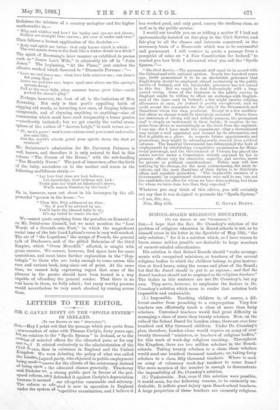LETTERS TO THE EDITOR.
SIR, C. GAVAN DUFFY ON THE "SPOILS SYSTEM" IN IRELAND.
[TO TUR ]tDITOR OF TEE" BPIWTATOR."] 6'R.,—May I point out that the passage which you quote from ,` conversation of mine with Thomas Carlyle, forty years ago, 'IR no relation to the "Spoils System" in Ireland, or to the ereEkion of salaried offices for the educated poor, or for any 4m.ee'e ? It related exclusively to the administration of the 431.Vil S.„rioe, then in existence in England and the United iClugd°321 We were debating the policy of what was called the LindsajLayard party, who objected to public employment being made a-oserve for the clients of the aristocracy, instead of being open. the educated classes generally. Thackeray and Dickens toc. a strong public part in favour of the pro- spoed reform, 'II defended it against Carlyle's depreciation because it seemed me altogether reasonable and salutary. The reform so a.d%ted is now in operation in England under the system of tinpetitive examination, and I believe it has worked good, and only good, among the studious class, as well as in the public service.
I would not trouble you on so trifling a matter if I had not systematically insisted on fair-play to the Civil Service, and fair-play to all the classes and interests concerned, as the necessary basis of a Home-rule which was to be successsful and permanent. I will venture to quote a passage from a pamphlet of mine on "A Fair Constitution for Ireland," to remind you how little I advocated what you call the "Spoils System :"— " The Civil Bervice.—The permanent staff must be in accord with the Cabinet and with national opinion. Nearly two hundred years ago, Swift pronounced it to be an intolerable grievance that Englishmen should be employed almost exclusively in the public service of Ireland, and the intolerable grievance has not ceased to this day. But we ought to deal forbearingly with a long- rooted wrong. Some of the Irishmen in the public service in England might be willing to effect an exchange with English- men of the same rank in Ireland ; a few might receive retiring allowances at once, for Ireland is greatly over-officered; and we could accept the remainder for the sake of the Drumntonds and Hamiltons whom the class produced. Except in a few confiden- tial offices no change would be absolutely essential. Where there are statesmen of strong will and definite purpose, the permanent staff is simply an instrument in their hands ; it receives its im- pulse from above as unresistingly as the train from the engineer. I can say—for I have made the experiment—that a Government may accept a staff appointed and trained by its adversaries, and find it pliable as a glove. As respects future appointments and promotions, they might be advantageously removed from political influence. The Imperial Government has relinquished the bulk of employments by substituting competitive examination for Minis- terial patronage, and the Government of Victoria has placed. the entire service under a Commission strictly enjoined by law to promote officers only for character, capacity, and service, never for private or political considerations. Public men will lose nothing by the change, for the most embarrassing, the most in- vidious, and the most thankless of their duties is to distribute
offices and regulate promotion. The implacable enemies of a Government,' an experienced statesman once said to me, are not the candidates for office for whom we have done nothing, but those for whom we have done less than they expected."
Whatever you may think of this advice, you will certainly not say that it was designed to promote the "Spoils System." —I am, Sir, &c.,


































 Previous page
Previous page